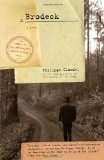Summary | Excerpt | Reading Guide | Reviews | Beyond the Book | Read-Alikes | Genres & Themes | Author Bio

A Novel
by Phillipe ClaudelThis article relates to Brodeck
 While Philppe Claudel makes no explicit references to any historical event, a number of them clearly influenced his novel. A particularly poignant example comes when Brodeck is forced to flee the city where he attends university because nationalist thugs respond to a popular protest by smashing store fronts and savagely beating anyone who looks like they don't belong. There is an obvious parallel to the infamous events of Kristallnacht, a touchstone in the progression toward the Nazi murder of the Jews.
While Philppe Claudel makes no explicit references to any historical event, a number of them clearly influenced his novel. A particularly poignant example comes when Brodeck is forced to flee the city where he attends university because nationalist thugs respond to a popular protest by smashing store fronts and savagely beating anyone who looks like they don't belong. There is an obvious parallel to the infamous events of Kristallnacht, a touchstone in the progression toward the Nazi murder of the Jews.
When Hitler occupied the chancellorship of Germany in 1933, he did so as head of a National Socialist party that shared anti-communist and anti-Semitic rhetoric with a number of other political movements in Europe. The difference between the Nazis and their counterparts would ultimately be that the former remained wedded to an inherently violent ethno-national world view as they rose to dizzying heights of power. As this fatal combination of fundamentalism and military might carried them toward epochal acts of genocide, the foot soldiers of Nazism would leave countless markers, one of the most well known of these being Kristallnacht.
 Jews had been a target of repression since the early days of the Nazi regime, along with the mentally and physically infirm, political dissidents, gays, and "gypsies". On November 9, 1938 German leaders issued orders that "actions" were to be taken against the Jews across the territories that then made up the Reich. These actions included burning and destroying synagogues and local businesses, in some cases leaving the streets blanketed with glass (thus the name Kristallnacht – "Night of broken glass"). Thousands of Jews were also rounded up and shipped to concentration camps, in what marked a decisive move toward the so-called "final solution."
Jews had been a target of repression since the early days of the Nazi regime, along with the mentally and physically infirm, political dissidents, gays, and "gypsies". On November 9, 1938 German leaders issued orders that "actions" were to be taken against the Jews across the territories that then made up the Reich. These actions included burning and destroying synagogues and local businesses, in some cases leaving the streets blanketed with glass (thus the name Kristallnacht – "Night of broken glass"). Thousands of Jews were also rounded up and shipped to concentration camps, in what marked a decisive move toward the so-called "final solution."

Filed under People, Eras & Events
![]() This "beyond the book article" relates to Brodeck. It originally ran in August 2009 and has been updated for the
July 2010 paperback edition.
Go to magazine.
This "beyond the book article" relates to Brodeck. It originally ran in August 2009 and has been updated for the
July 2010 paperback edition.
Go to magazine.
It is always darkest just before the day dawneth
Click Here to find out who said this, as well as discovering other famous literary quotes!
Your guide toexceptional books
BookBrowse seeks out and recommends the best in contemporary fiction and nonfiction—books that not only engage and entertain but also deepen our understanding of ourselves and the world around us.